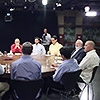Question: Ninth rule: maintain team spirit.
During the meetings we need to rise above our feelings and interact with the team members regardless of our true state, that is, play the state to which we want to come. Playing a more perfect state attracts forces upon us that change us.
What are these forces? How do we play these states artificially?
Answer: It is necessary to outline such conditions and exercises in order to cause these states and try to analyze them later. This is a psychological group practice.
Question: Can the principle of “habit becomes second nature” come into action here? Can the fact that we artificially begin to cultivate these states and to rise above our feelings and resentments become a habit?
Answer: The habit is good when there are disturbances that are at the same levels, in the same conditions. However, if these are growing interferences and on other conditions, then the habit will not help much. Here you need the influence of the team, of the environment.
Question: Does the method itself consist of modeling the correct connections, describing them, and trying to reach these connections by some means?
Answer: Yes. However, we must understand that in such a team we are constantly growing and constantly generating new levels of integral interaction. Hence, it is not a mechanical job.
Question: Tenth rule: establish a framework of behavior, a system of control, and encourage self-control.
At the first stage, should control be provided by the integrator, or should we choose the responsible individuals from the team itself, and then constantly change them so that there will be no dislike for them from others?
Answer: I think it is better from the team itself. The team must constantly change roles between its members. Then everyone will understand what is required of them and others. And the instructor stands outside the team and sees how they work.
[268331]
From KabTV’s “Management Skills” 6/18/20
[268331]
From KabTV’s “Management Skills” 6/18/20


No comments:
Post a Comment